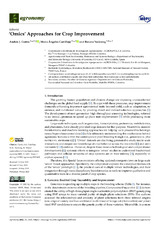‘Omics’ approaches for crop improvement
Autor
Cortés, Andrés J.
Castillejo-Sánchez, María A.
Yockteng, Roxana
Editor
MDPIFecha
2023Materia
Human populationCrop improvement
Climate change
Large-scale techniques
METS:
Mostrar el registro METSPREMIS:
Mostrar el registro PREMISMetadatos
Mostrar el registro completo del ítemResumen
The growing human population and climate change are imposing unprecedented challenges on the global food supply [1]. To cope with these pressures, crop improvement demands enhancing important agronomical traits beyond yield, such as adaptation, resistance, and nutritional value, by pivoting direct and indirect selection approaches [2]. The development of next-generation high-throughput screening technologies, referred to as ‘omics’, promises to speed up plant trait improvement [3] while producing more sustainable crops.
Large-scale techniques, such as genomics, transcriptomics, proteomics, metabolomics, and phenomics, have already provided large datasets for that purpose. Meanwhile, modern bioinformatic and machine-learning approaches are helping us to process this heterogeneous hyper-dimensional data [4] while ultimately understanding the mechanisms behind agronomic features within the contemporary plant breeding triangle (i.e., genomics vs. phenomics vs. enviromics) [5]. ‘Omics’ datasets are also being generated to study macro-scale interactions and deepen our knowledge of crop behavior across the microbial [6] and environmental [7,8] continua. However, despite these massive technological and computational developments [4], systemic efforts to integrate ‘omics’ studies to understand biochemical pathways and cellular networks of crop systems are in their infancy [9], especially in orphan species [10].
Therefore, this Special Issue envisions offering updated emergent views on large-scale ‘omics’-based approaches. Specifically, the compilation explores the conceptual framework of the ‘omics’ paradigm [11], the practical uses of multiple ‘omics’ technologies, and their integration through trans-disciplinary bioinformatics as tools to improve qualitative and quantitative traits in a diverse panel of crop species.

